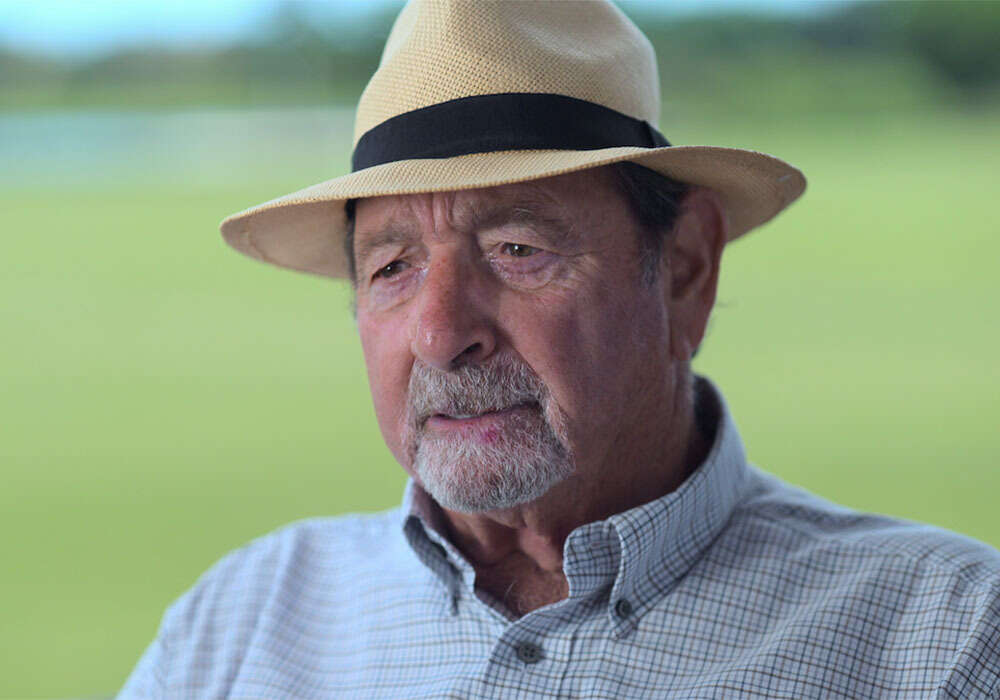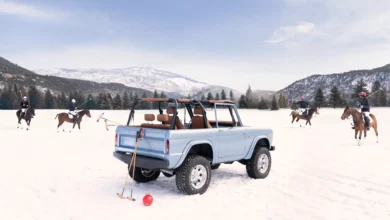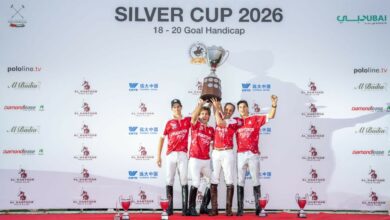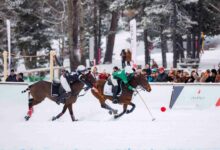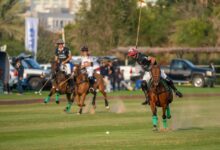There are a handful of voices that frame a sport so completely that the sound becomes part of the spectacle. In American polo, that voice has belonged to Tony Coppola for half a century. Gravelly, warm, and instantly recognizable, he is the soundtrack to goal-line scrambles in Wellington, to long summer chukkers on the East Coast, to the U.S. Open Polo Championship and countless charity matches that seeded new fans across the country. This year marks a set of milestones that feel both monumental and tender: Coppola stepped to the microphone at the U.S. Open for the final time, celebrated the 50th anniversary of The Tackeria—the equestrian shop he founded that became a pillar of Wellington’s growth—and watched his son, Matt, lift a major trophy as a champion.
It is rare when a sport’s past, present, and future are all gathered in one man’s orbit. With Tony Coppola, they are.
A microphone, a community, and a country coming to polo
Before the sport had slick livestreams and beside-the-goal slow motion, it had a man with a field list, a set of binoculars, and an uncanny gift for making non-riders understand a fast, complex game. Coppola did not simply call polo—he translated it. He explained how a near-vertical stop at the boards preserved the line of the ball. He turned a two-to-one ride-off into an explanation of angles and balance. He teased and encouraged. He told stories between chukkers. He made room for the humor that sits right alongside courage in every good polo match.
If you were a first-timer sitting in the grandstand at the old National Polo Center, it was Tony who told you why one player peeled away and another accelerated, why the umpire’s whistle mattered, and how the strategy evolved as horses tired and the match tightened. If you were a seasoned groom with sweat in your eyes, his voice cut across the field and helped you time a handoff at the pony lines. If you were a sponsor considering your first team, Tony made you feel you were already part of the story.
Announcing, as he practiced it, is an intimate conversation carried out on a loudspeaker. He called the goals, yes, but he also called the relationships—between rider and horse, between patron and pro, between a small outdoor sport and the communities that rallied around it. That is why, whenever he pauses between words, you can hear the crowd listening.
Saying goodbye to the Open—on a day that stitched generations together
At the Open this spring, Tony’s voice rose above the packed grandstand as it has so many times. There was an extra edge of emotion, the soft burnish of a chapter ending. He had announced many climactic finals, but this one held a personal grace note: his son Matt was on the winning side.
Coppola has admitted to bittersweet feelings about closing his U.S. Open announcing career, but he also found joy in the symmetry: to narrate one last final with his own son riding in the decisive moments felt like the universe tipping its hat. For those of us who have watched the family through the years, the image lands with the immediacy of a photograph. Father in the booth, son on the field, both doing what they love with a steady calm that has always been the Coppola way.
The day was not just a sporting send-off; it was a rite of passage. For spectators who grew up with Tony in their ears, it was a reminder that the announcer’s booth is not a place of distance but a bridge. Near the end, after the last chukker, he lingered over the microphone a moment longer than usual, as if letting the silence envelop him gently before he relinquished it to the next guardian of the sound.
The Tackeria at 50: a small shop that became a horse town’s heartbeat
If you want to understand Tony Coppola’s influence, walk into The Tackeria on a winter morning. You’ll find a groom needing a special curb chain, a junior rider trying on her first pair of tall boots, and a veteran pro whose stirrup leather snapped at stick-and-ball. Horses, like sports, are built on details; the right detail at the right moment keeps a rider safe and a game alive. For fifty years, The Tackeria has supplied those details with the kind of reliability that builds a town’s trust.
When Wellington was still a rough sketch—canals mapped out, plots platted, dreams bigger than budgets—Tony placed a bet on the idea that Florida’s winter horse season could become something grand. His shop wasn’t merely a storefront; it was a community desk. Friends traded gossip and gear; posters for charity matches mixed with invitations to benefit dinners; a young player could be introduced to a patron or a string of seasoned schoolmasters. In a sport that can look exclusive from the outside, The Tackeria remained a place where anyone who loved horses could walk in and be seen.
Fifty years is long enough for a store to become a memory palace. There are parents who bring their children to be fitted for boots where they themselves were measured decades before. There are champions who signed their first mallet on that counter and schoolkids who cashed their first summer paychecks there. The story of Wellington is often told through arenas and stadiums; just as vital is the shop whose shelves have caught the dust of half a century of horse shows and polo seasons.
The craft of calling a fast game
Announcing polo is an athletic act disguised as narration. The field is vast. The players change mounts. The ball can disappear in a thicket of legs and suddenly reappear already caroming toward goal. A good announcer must be both court reporter and poet—specific enough to track numbers and names, nimble enough to capture the rhythm that keeps spectators leaning forward.
Tony’s method has always been old-school in the best sense: do your homework, stay humble, keep your eye on the horse. He talked with grooms. He listened to vets. He asked players not only about tactics but also about the quirks of a mare they trusted at 60 km/h. He avoided the trap of jargon for jargon’s sake, translating just enough to empower a newcomer without flattening the sport’s nuance. And he kept it fun. Polo has its own pulse, and Tony kept time.
One of his signature touches was the way he introduced horses by temperament as much as by name. He’d mention a gelding’s honesty on the near side, a mare’s catlike turn at the boards. In doing so, he acted as a quiet advocate for equine athletes—reminding crowds that the stars of the show are not only the players in team jerseys but the animals carrying them.
Mentoring the next voices
Great announcers don’t simply step away; they seed the craft for those who follow. Over the years Tony opened his booth to young broadcasters, pony-club kids, and writers who wanted to understand the sport from a different angle. He explained how to keep notes within reach, when to let the crowd speak for itself, how to balance excitement with respect during injuries, and why a tone of generosity wins you more listeners than a clever put-down ever will.
His imprint is audible in the next generation of polo storytellers: the cadence, the curiosity, the awareness that we are lucky to watch a game that asks so much of both horse and rider. Tony’s retirement from the Open is not a period; it is a semicolon, a pause before the sentence continues in voices he helped shape.
Family as through-line: Matt and Crew carry the banner forward
American polo’s growth has often hinged on families who make the sport a way of life. The Coppolas are one of those families. Tony’s son, Matt, is an established figure in top-flight competition—a rider with quiet hands and an instinctive sense of where a play is going. That he lifted a trophy in the very arena where his father narrated his last Open only sharpened the sense of continuity.
Earlier this year, a new image joined the family album: Crew, Tony’s grandson, making his first small appearances around the sport. The timeline is striking—grandfather at the mic, father on the field, grandson on the first rungs of his own ladder. Whether Crew charts a course toward high-goal polo or simply grows up with horses in his life is almost beside the point; what matters is that the game has been woven into the family’s identity with the same integrity that shaped Tony’s decades on the job.
What a voice can do for a sport
Ask insiders to list the turning points that broadened American polo’s reach, and they will point to obvious markers: the consolidation of the winter season in Wellington, the television era, international patronage, youth pipelines, sponsorships. Threaded through those markers is Tony Coppola’s microphone. He helped make polo legible to a general audience—a necessary step if a niche sport wants to be more than a private pastime.
He also modeled a form of hospitality. Spectators who felt welcomed by his commentary were more likely to come back next week with friends. Sponsors who heard their names handled with class felt they were investing in a culture as much as in a game. Young riders who recognized their own horses in his descriptions felt seen. In an age that prizes viral clips, Tony invested in something subtler and more durable: trust.
A milestone year—and a living legacy
Announcers often vanish into the edges of the frame. They are meant to amplify others. Tony Coppola has always honored that job description. Yet the sport has insisted on bringing him back into focus this year: the fiftieth birthday of a shop that shaped a horse town; the final Open call delivered with grace; a son’s triumph and a grandson’s first steps; a community saying, without fuss, You mattered to us.
What remains is the part of a legacy no ceremony can bestow: the model he set for how to serve a sport you love. Be prepared. Be fair. Center the horse. Treat newcomers as future regulars. And when the final whistle sounds, sign off with dignity.
The voice of American polo did not disappear; it simply moved from the loudspeaker into the people who will narrate the next fifty years. If we are lucky, we will carry Tony’s cadence forward—clear, generous, and tuned to the heartbeat of a game that is faster than memory and, thanks to him, easier to understand.

